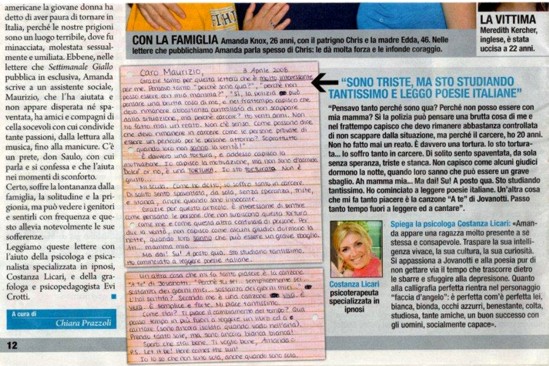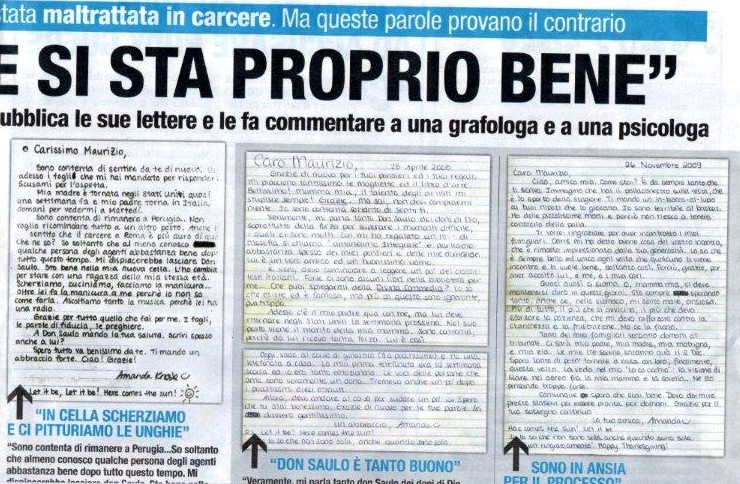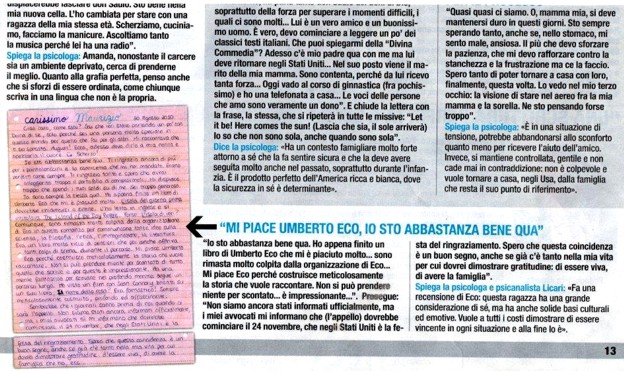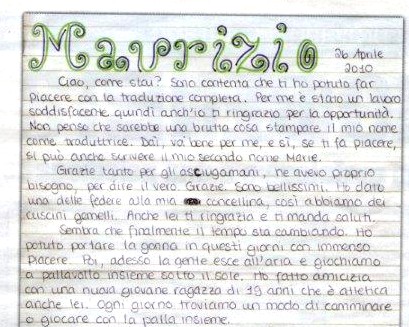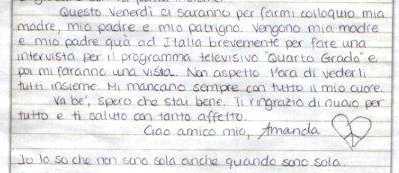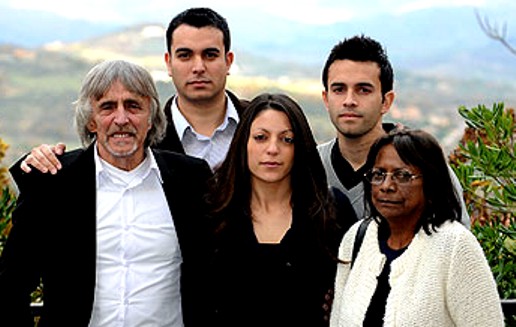
Political & economic headsup: US is demonstrating unsorted systems problems in spades. Do watch your investments. As Washington DC policy gets more & more off-target, big New York investors are betting very heavily that stocks will soon crash. Gross systems mismanagement 2017-20 tanked stocks several times.
Category: Hoaxers from 2011
Tuesday, May 28, 2013
Demonizations By Knox: Knox Lacks Hard Proof; Sparks Widespread Anger & Contempt
Posted by Miriam
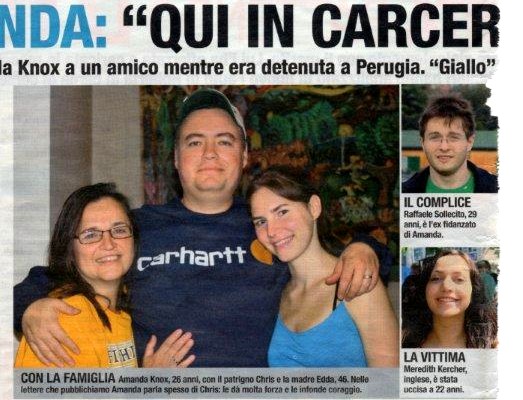
[Header of the Giallo article; the rest off it is at bottom; click for a larger image]
1. The Fake Knox In Her Demonizing Book
Amanda Knox may have felt she was “waiting to be heard” in America but here in Italy we have heard her many times, and we feel we know her pretty well.
Her book and interviews don’t sound like her at all. They sound like nasty legal stunts and nasty PR at work. It is easy to disprove her disparagement of officials and her friends here, and an investigation by the Chief Prosecutor in Bergamo is already under way.
So the big question for us here is not angrily “Who are these appalling police, prosecutor and prison officials, and why did they do these terrible thing?” but sadly “Why was she compelled to invent all this stuff?” and “Why is she so scared to come back?”
2. The Amanda Knox That We In Italy Know
I have translated six of her letters from prison just published in the crime magazine Giallo plus the introduction and the graphologist’s analysis. This is more like the Amanda Knox we know, not the invented one in the book.
1. The Giallo magazine’s Introductory framing of Knox’s letter below
Amanda: “Here In Prison Things Are Okay”
So writes Knox to a friend while she was a prisoner in Perugia. [The true crime magazine] Giallo publishes her letters, and then has them commented on by a graphologist and a psychologist
The letters you see published on these pages are from Amanda Knox, the young American accused, along with her ex boyfriend Raffaele Sollecito, of the murder of the British student Meredith Kercher, that took place in Perugia the 1st of Nov. 2007.
Knox, 26 years old, was acquitted in appeal, but now Cassazione has decided that the appeal must be redone. While waiting for this complicated judicial process to restart, Amanda lives in Seattle, and is traveling around America to launch her new book Waiting to be Heard for which she was paid several million euro by her publisher.
To the American television interviewers, the young American woman has said she is scared of coming back to Italy, because our prisons are terrible places, where she was threatened, molested sexually, and humiliated.
Well, in the letters that Giallo publishes in an exclusive, Amanda writes to a social worker, Maurizio, who helped her, and she seems neither desperate or scared, she has friends and cellmates with which to share many interests, From reading to music, up to manicures. There is a priest, Don Saulo, with which she talks, and confesses, and helps her in her moments of discouragement.
Sure, she suffers from the distance from her family, her loneliness and her imprisonment, but she can see her parents and speak with them frequently, and this notably relieves her suffering.
2. Six letters from Knox to the social worker Maurizio 2008-2010
April 3 2008
Dear Maurizio,
Thank you very much for that letter that for me is very interesting. I was thinking: “Why am I here?”, “why can’t I be with my mother?”, ” Yes the police can think badly about me, and meanwhile I do understand that I have to be in control, not run away from the situation, but why prison? I am 20 years old, never committed a crime, it is senseless. How can they say that I have to stay in prison like the people that can be a danger to others? Above all when they don’t know the truth?
It really is a torture and now I understand the motivation. I understand the motivation, but I do not agree. “Sweet” or not it is a “TORTURE”. I am being tortured and it is not right…...
Sorry. As I said I do suffer a lot in prison. Generally I am scared, alone, with no hope, sad, and tired, even if I am innocent.
Thank you for the article. It is interesting to know how people that do not undergo this torture as I and hundreds others think. To tell you the truth, I can’t understand how some judges can sleep at night, when they very well know that it can be a grave mistake. ah… mamma mia….
Come on! It is O.K. here. I am studying a lot and have started reading Italian Poetry.
Another thing that I like a lot is the song “A te” by Jovanotti. “perché tu sei…semplicemente sei….sostanza dei giorni miei…sostanza dei giorni miei…. (lyric of the song n.d.r.). Have you heard it? According to me it is a live song. It is true. Simple and strong. I like it a lot.
How are you? Do you like the change of weather? I spend more time outside reading a book and singing (I am still alone when I go outside). I am sun tanning but I’m still white white!
Hope you are OK. Love, Amanda
P.S. Let it be! Here comes the sun! I know that I am not alone, even when I am alone
April 28 2008
Dear Maurizo,
Thanks again for your thoughts and your gifts.
I really like the T-shirts and the book of art. Beautiful! Mamma mia the talent of the artists always surprises me! Thanks. But you know, you do not have to buy me anything. I am happy just to hear from you.
Really, [Priest] Don Saulo speaks to me so much about God’s gifts, especially about the strength to overcome the difficult moments, of which there are so many. He bought me a book on philosophy entitled “Umanesimo Integrale” and we speak often of my thoughts and my questions. He is a true friend and a very good man.
It’s true, I must start to read a bit of classic Italian texts. Maybe there are some books in the library for me….......Who can explain to me about “Divina Commedia”? I know it exists and that it is famous, but more than that I am ignorant, unfortunately.
Now my father is here with me, but he has to return to the United States, next week. In his place the husband of my mother, will come. I am happy, because from him I receive a lot of strength. He is like that.
Today I go to the gym course (in a bit) and I have a home telephone call. My first telephone call was last week and I was so excited. The voices of the people I love are really a gift. I trembled a bit after those so little ten minutes.
Now, I must go to the course to sweat a bit. 😊 I hope you are very well. Thanks again for your words.You are very kind.
A hug, Amanda 😊
P.S. Let it be! Here comes the sun! I know I am not alone, even when I’m alone.
November 26 2009
Caro Maurizio,
Ciao, my friend. How are you? It’s from forever that I write you. I imagine that you must have basketball in your head, since it is the season’s sport. I send best wishes to your nephews, who play it. I am terrible at basket. I have very small hands, therefore I can’t control the ball.
I would like to thank you for meeting with my family. Chris told me nice things about your encounter, he was impressed by your generosity. I know that it is always nice and unique, every time that somebody comes toward you and they like you, just like that. Therefore, thank you, for having welcomed him, me and my dear ones.
Nearly, nearly there. O mamma mia, one has to remain strong in these days. I am always hoping so much, even if, in my stomach I feel sick, anxious. More than anything, the closer it gets, the more I have to reinforce my patience against the fatigue and frustration. But I will make it.
A lot of my family will come tomorrow to be in court. There will be my father, my mother, my stepmother and my aunt. My three sisters will be here on Dec. 2. I hope so much to be able to go home with them, finally, this time. I see it in “my third eye” the vision of being on the plane between my mother and my sister. Maybe, I am thinking to much about it.
Anyway, I hope you are well. I must go to sleep early tonight, to be ready for tomorrow.
Thank you for your continued support.
Your friend, Amanda 😊
Here comes the sun! Let it be! I know that I am not alone even when I am alone,
Happy Thanksgiving!
April 20 2010
MAURIZIO
Hi! How are you? I’m happy that I made you happy with the full translation. For me it was a satisfying job, so I thank you too for the chance that you gave me. I don’t think it will be a bad thing put up my name as a translator. OK it is fine for me and yes if you like it, you can even put my second name Marie,
Thank you very much for the towels, to be truthful I really needed them. They are beautiful. I gave one of my pillow cases to the other inmate so we have twin pillows. She thanks you too and sends her best wishes.
Seems like that the weather is finally changing. With great pleasure I was able to wear a skirt in these days. Now people are out and we play volleyball together under the sun. I made friends with a new 19 years old girl: she is an athlete too. Every day we walk or play with the ball together,
Next Friday my mother, father and stepfather will be here for a visit. Mi mother and father are here for a short time to be interviewed on TV at “Quarto Grado” and then will come here. Can’t wait to see them, I miss them with all my heart.
Well, hope that you are fine. Thank you again for everything and salute you with all my affection
Hi your friend, Amanda
I know that I am not alone even when I am alone
August, 30 2010
Dearest Maurizio
Hi dear, how are you? Do you know that yesterday I was taking with D…. about you, only because you are a very special person in this world, for all that you do for others. She told me that you got married. Congratulations! Now I have to tell to my grandmother and break her heart! 😊 Just joking!
I am well enough here. I thank you again for the shorts and shirt that you send me. They were perfect as always. Thanks and I hope that you didn’t lighten your wallet too much. I am kind of disappointed that you spend your money on me, you are too generous. I am always the same here.
Just finished reading a book by Umberto Eco book that I liked a lot. In Italian should be ” L’isola del giorno prima”, I read it in English “The island of the day before”; maybe the “island of yesterday”? Anyway, I was favorably moved by Eco’s organization in this novel in order to communicate so many ideas on science, philosophy, ethic, imagination, literature. It was a book very rich on thoughts, and colpi di scena during it’s path.
I like Umberto Eco because he meticulously builds the story that he wants to tell. Of all he writes, nothing is taken for granted and this is remarkable, he has a fantastic mind to dig deep while following a long track. I saw a Sean Connery movie based on a book of his “Il nome della Rosa?” It was fantastic. Always meticulously built, deep and fascinating.
Seems like that the newspapers know before us when the appeal proceeding will take place. We still have not been officially notified, but my lawyers told me that it should start Nov. 24th; that in the USA is Thanksgiving Day. Hope that it is a good omen even if there is a lot in my life for which I should be grateful: to be alive, having the family that I have etc…
[Undated letter]
Dearest Maurizio,
I am happy to hear from you again. I use now the paper you sent me to answer you. Sorry to make you wait. My mother has returned to the United States nearly a week ago, and my father returns to Italy tomorrow, to see me Tuesday.
I am happy to remain in Perugia. I do not want to restart everything in another place. Also I? (blurred) have heard that the prisons in Rome are harsher than here. Who knows?
I only know that at least I know some of the prison officers fairly well, after all this time. I would be sorry to leave Don Saulo. I feel fine in my new cell. I changed it so I could be with a girl my own age. We joke, cook, we do manicures. Further, she does a manicure for me, because I do not know how to do one. We listen to music a lot because she has a radio.
Thank you for all you do for me. The paper, your words of confidence, your prayers. To Don Saulo I will send your greetings. Do you write often to him too? I hope all is very well with you. I send you a big hug. Ciao! Thank you!
Amanda Knox 😊
Let it be, Let it be! Here comes the sun! (drawing of a sun)
3. Comments by educational psychologist and graphologist Evi Crotti
Looking at the Amanda Knox letters it is evident right away how organized and precise she is: she has a perfect handwriting, elegant and without smudges. We try to interpret it with the help of the graphologist and educational psychologist Evi Crotti.
She explains: Her perfect, organized handwriting, without margins and few spaces indicates that we have before us a girl that is decisive, strong, who wants to dominate, and knows she can succeed in life. She puts herself In the center and leaves no place for others. Amanda displays a way of writing that is typically northamerican, in small print, called script.
The handwriting, elegant, big and curved, reveals an extroverted personality, and with a notable sense of taste. Her language is fluid and polished, and the accuracy with which she writes, tells us that this young girl has a need to maximize and nurse her image, to the point of becoming narcissistic: after her signature she draws herself with a smiling face.
Amanda leaves no space between the lines: this signifies an element of interior loneliness, which she attempts to compensate at any cost with approaches of verbal intrusiveness. This tells us that that her strong narcissistic behavior can escape control and lead her to present unstable behaviors. The fact instead that her handwriting is always in horizontal lines, without blurs, gives testimony to her practical intelligence and her strong tenaciousness, that allow her to reach her goals.
Also, the handwriting is rigid and this signifies that she knows how to use words with care and determination. Evi Crotti underlines that the handwriting is static: It is a sign of a behavior that is very seductive. Attention, the need to be attractive at all costs can make her lose sight of the objectivity of judgment , taking her to a subjective vision of circumstance reality.
Conclusion: Amanda seems to be in a continuous search of approval and acceptance from those who live around her. Her egocentricity, maybe pushed unto the point of a bogus personality, demonstrates that this girl possess a highly emotional immaturity that doesn’t allows her to love in an unselfish way. The handwriting slightly slanted to the left indicates a contradiction between the need to be liked and the reactive refusal toward a feminine figure: for her, probably every woman represents a rival.
Sunday, May 12, 2013
Demonizations By Knox: OGGI Charged For Article Conveying False Claims To Italy #2
Posted by Our Main Posters
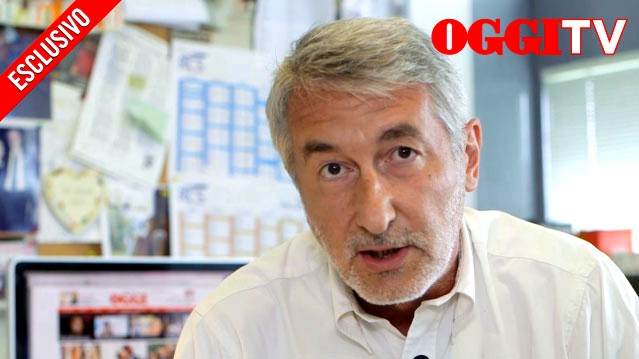
[Umberto Brindani, editor of Oggi, a Mario Spezi ally, being sued for publishing Knox’s claims in Italy]
The decision of Amanda Knox and her lawyers and publishers to flaunt her dishonest claims in Italy seems seriously ill advised.
Pouring gasoline on the fames, it has opened up a fast-track way for those many who she nastily attacks to put the real truths in front of the world. Nobody who foolishly parrots her will be immune from being required to testify by the courts, her own lawyers included.
Here are our own short rebuttals of the Knox claims Oggi specifically flaunts to Italy in its unresearched review.
- Knox was NOT interrogated for days and nights. She was put under no pressure in her brief witness interviews except possibly by Sollecito who had just called their latest alibi “a pack of lies”.
- Knox WAS officially investigated in depth, after she surprisingly “confessed” and placed herself and Patrick at the scene. Prior to that she’d been interviewed less than various others, who each had one consistent alibi.
- Knox herself pushed to make all three statements without a lawyer on the night of 5-6 November 2007 in which she claimed she went out from Sollecito’s house, met Patrick, and witnessed him killing Meredith.
- Far from Knox being denied a lawyer, discussions were stopped before the first statement and not resumed, in the later hearing she was formally warned she needed one; she signed a confirmation of this in front of witnesses.
- Prosecutor Mignini who Knox accuses of telling her a lawyer would hurt her prospects when she claims she asked for one was not even in the police station at that interview; he was at home.
- She was not prohibited from going to the bathroom. At trial, she testified she was treated well and was frequently offered refreshments. Her lawyers confirmed this was so.
- She was not given smacks by anyone. Over a dozen witnesses testified that she was treated well, broke into a conniption spontaneously, and thereafter was hard to stop talking.
- There is no evidence whatsoever that Knox was subject to “something similar to torture” and as mentioned above only Sollecito applied any pressure, not any of the police.
- There is nothing “suicidal” about returning to Italy to defend herself at the new appeal. Sollecito did. She risks an international arrest warrant and extradition if she doesn’t.
- There is no proof except for her own claims of sexual molestations in prison; she is a known serial liar; and she stands out for an extreme willingness to talk and write about sex.
- Many people have testified she was treated well in prison: her own lawyers, a member of parliament, and visitors from the US Embassy were among them; she herself wrote that it was okay.
- She may have based her account on her diaries and “prodigious memory” but the obviously false accusation against the prosecutor suggests that much of the book was made up.
- The investigators had a great deal of evidence against Knox in hand, not nothing, and they were not ever faulted for any action; they helped to put on a formidable case at trial in 2009.
- “Police and Italian justice work with such incompetence, ferocity, and disdain for the truth” is contradicted by a very complete record prior to trial which was praised by the Supreme Court.
- Mr Mignini has NO bizarre past at all. He is widely known to be careful and fair. He would not have been just promoted to first Deputy Prosecutor General of Umbria otherwise.
- He was put on trial by a rogue prosecutor desperate to protect his own back from Mignini’s investigations; the Supreme Court has killed the trumped up case dead.
- There was nothing “mysterious” about Knox being taken to the crime scene to see if any knives were gone, but her wailing panic when she saw the knives was really “mysterious”.
- Knox never thought she was in prison for her own protection; she had signed an agreement at the 5:00 am interview confirming she did know why she was being held.
- Monica Napoleoni did not “bluff” that Sollecito had just trashed their joint alibi; he actually did so, because his phone records incriminated him; he agreed to that in writing.
- There was no crescendo of “yelling and intimidations that lasts from 11 at night until 5.45”. There were two relatively brief sessions. Knox did most of the talking, named seven possible perps, and drew maps.
- There was zero legal requirement to record the recap/summary interview, no recording has “gone missing” and many officers present testified to a single “truth” about what happened.
Demonizations By Knox: OGGI Charged For Article Conveying False Claims To Italy #1
Posted by Our Main Posters

The popular Italian magazine Oggi was sent a review copy of Knox’s book by somebody in the United States.
Oggi has been a frequent vehicle for the Knox entourage version of events, and it has carried a number of lurid pro-Knox splashes. The magazine has a long history of nasty jabs at prosecution and police who as career civil servants under unusually strong rules have no easy ways of explaining their side.
Like all of Oggi’s articles on the case, this shrill and foolish piece is totally one-sided and absolutely unresearched.
- Oggi is ignorant of the fact that many days of testimony by police officers at trial in 2009 contradict Knox’s book, highly convincing testimony, to which Knox on the stand had only the most feeble and unconvincing of responses.
- Oggi is ignorant of the fact that Judge Massei and even Judge Hellmann disbelieved her, and (in extensive reasoning) the Supreme Court (make sure to read parts 3, 7 and 15 there).
- Oggi is ignorant of the fact that Knox was sentenced to three years in prison for the criminal framing of Patrick, and that sentence was confirmed both by Judge Hellmann and the Supreme Court - in effect, unless new FACTS come to light, the truth is known and the case is closed.
The book is already (see next post) the subject of a lawsuit which was filed Friday in Bergamo, where Oggi has its headquarters. Knox is also expected to be investigated for contempt of court. Her book carries at least one no-contest false accusation of a crime: Knox claims the much respected Prosecutor Mignini illegally interrogated her without a lawyer and attempted to make her definitively accuse Patrick Lumumba. This is repeated below. In fact Mr Mignini was not even there.
This translation below of the Oggi piece is by our main poster Catnip. Passages that can EASILY be shown to be false (Oggi would have known they were false with a mere 3-4 hours of research) are highlighted here.
See our own rebuttals in this next post.
Amanda Knox: The American girl’s sensational story
Chilling. No other adjectives come to mind after having read Waiting to be Heard, finally released in the United States. An extremely detailed and very serious charge against the police and magistrates who conducted the investigation into the murder of Meredith Kercher.
Immediately after the crime, Amanda recounts, and for entire days and nights, they had interrogated the American girl and placed her under pressure to make her confess to a non-existent truth, without officially investigating her, denying her the assistance of a lawyer, telling her lies, even prohibiting her from going to the bathroom and giving her smacks so as to make her sign a confession clearly extorted with something similar to torture.
And now the situation is very simple. There are only two choices: either Amanda is writing lies, and as a consequence the police officers and magistrates are going to have to sue her for defamation; or else she is telling the truth, and so they are going to have to go, not without being sanctioned by the CSM [the magistrates’ governing body] and the top brass of the Police. The third possibility, which is to pretend that nothing has happened, would be shameful for the credibility of our judicial system.
Amanda Knox has written her Waiting to be Heard memoir with the sense of revulsion and of relief of someone who has escaped by a hair’s breadth from a legal disaster, but has got her sums wrong. Cassation has decided that the [appeal] proceedings have to be redone and the hearings should be (re)commencing in October before the Florence Court of Appeal.
In a USA Today interview, Ms Knox has not excluded the possibility of “returning to Italy to face this battle too”, but it would be a suicidal decision: it’s likely that the appeal will result in a conviction, and the Seattle girl will end up in the black hole from which she has already spent 1,427 days.
In this way Waiting to be Heard risks being the “film” on which Amanda’s last words are recorded about the Mystery of Perugia, her definitive version.
We have read a review copy. And we were dumbfounded. Waiting to be Heard is a diary that has the frenetic pace of a thriller, written in a dry prose (behind the scenes is the hand of Linda Kulman, a journalist at the Huffington Post), even “promoted” by Michiko Kakutani, long-time literary critic at the New York Times.
The most interesting part does not concern the Raffaele Sollecito love story (which Amanda reduces it to puppy love: “With the feeling, in hindsight, I knew that he… that we were still immature, more in love with love than with each other”), and whoever goes looking for salacious details about the three Italian boys Amanda had casual sex with, one night stands, will be frustrated (Ms Knox describes those encounters with the nonchalance of an entomologist disappointed with his experiments: “We undressed, we had sex, I got dressed again with a sense of emptiness”).
There are no scoops about the night of the murder and even the many vicissitudes endured during the 34,248 hours spent in Capanne prison - the [claimed] sexual molestations suffered under two guards, the unexpected kiss planted by a bisexual cellmate, the threats made by another two prisoners - remain on the backdrop, like colourful notations.
Because what is striking and upsetting, in the book, is the minute descriptions, based on her own diaries, on the case documents and on a prodigious memory, of how Ms Knox had been incriminated (or “nailed”).
COME IN KAFKA. A Kafkian account in which the extraordinary naivety of Amanda (the word naïve, ingénue, is the one which recurs most often in the 457 pages of the book) mixes with the strepitous wickedness of the investigators decided on “following a cold and irrational trail because they had nothing better in hand”.
Devour the first 14 chapters and ask yourself: is it possible that the Police and Italian justice work with such incompetence, ferocity, and disdain for the truth? You place yourself in her situation and you scare yourself: If it happened to me? You’re in two minds: is it a likely accusation, or a squalid calumny, the version of Amanda?
Because in reading it you discover that in the four days following the discovery of Meredith Kercher’s body (on 2 November 2007), Amanda was interrogated continuously, and without the least of procedural guarantees [=due process].
She changes status from witness to suspect without being aware of it.” No one had told me my rights, no one had told me that I could remain silent”, she writes. When she asked if she had the right to a lawyer, the Public Prosecutor, Giuliano Mignini, had responded like this: “No, no, that will only worsen things: it would mean that you don’t want to help us”. Thus, the Public Prosecutor, Giuliano Mignini.
For a long period of time, Ms Knox, who at the time spoke and understood hardly any Italian at all, mistook him for the Mayor of Perugia, come to the police station to help her.
Then, with the passage of time and of the pages, the assessment changes: Mignini is a prosecutor “with a bizarre past”, investigated for abuse of office (he was convicted at first instance, but Cassation annulled the verdict on the grounds of lack of jurisdiction: the case will be tried again in Florence) and with the hunger to fabricate “strange stories to solve his cases”.
Mignini “is a madman who considers his career more important than my liberty or the truth about the killing of Meredith”. On the phone, the Perugian prosecutor reacts with aplomb: “First I will read the book and then I will consider it. Certainly, if it really calls me “˜mad’ or worse, I think I will file suit”.
BEING IN PRISON IS LIKE CAMPING Amanda goes looking. When the officers mysteriously bring her along to the crime scene inspection of the apartment below the one in which she and Meredith were living in, Ms Knox put on the shoe protectors and the white forensics gloves and called out “ta-dah!” spreading her arms “as if I was at the start of a musical: I wanted to appear helpful”.
When they dragged her in handcuffs into Capanne Prison, she believed what the Police would have told her, and that was they would hide her for a couple of days to protect her (from the true killer, one presumes) and for unspecified bureaucratic reasons. “In my head I was camping: ‘This won’t last more than a week in the mountains’ I told myself” writes Amanda.
They take her money off her, and her credit cards, licence [?] and passport, and she draws strength from repeating to herself that “surely they’re not going to give me a uniform, seeing that I’m a special case and that I’ll be here for only a little while”.
But it’s the account of the notorious interrogation that takes the breath away. Around ten in the evening on her last day of freedom, Ms Knox accompanies Raffaele to the police station (he was called in, also without a lawyer, by the Police) and is thrown into a nightmare which she populates with many faces: there is Officer Rita Ficcara, who gives her two cuffs on the head (“To help you remember” she would say); there’s another officer who advises her: “If you don’t help us, you’ll end up in prison for 30 years”; Mignini arrives and advises her not to call a lawyer; super-policewoman Monica Napoleoni dives in and bluffs: “Sollecito has dropped your alibi: he says that on the night of the murder you had left his apartment and that you had told him to lie to ‘cover you’ “.
And a crescendo of yelling and intimidations that lasts from 11 at night until 5.45 in the morning. Seven hours “produce” two confessions that, exactly because they are made without a defence lawyer, cannot be used in the proceedings, but forever after “stain” the image of the accused Knox: Amanda places herself at the scene of the crime and accuses Patrick Lumumba.
RAFFAELE CONFIRMS THE ACCUSATIONS An account of the horror is confirmed by Sollecito in his memoir, Honor Bound, Raffaele writes of having heard “the police yelling at Amanda and then the cries and sobs of my girl, who was yelling “Help!” in Italian in the other room, and of having being threatened in his turn (“If you try to get up and go, I’ll punch you till you’ll bleed and I’ll kill you. I’ll leave you in a pool of blood”, another officer had whispered to him).
Published lines which have passed right under the radar of the Perugian investigators: “No legal action [against the interrogators] has been notified to us,” Franco Sollecito, Raffaele’s dad, tell us. For having recounted the sourness of her interrogation in court, Amanda was investigated for calunnia: the trial will take place in Florence. This one, too, will be a circumstantial case: it’s the word of two young people against that of the public prosecutor and the police.
The recording of the interrogation would have unveiled which side the truth stands on. But it has gone missing.
See our own rebuttals in this next post.
Below: images of the 4-page Oggi spread. Click for larger versions to read.

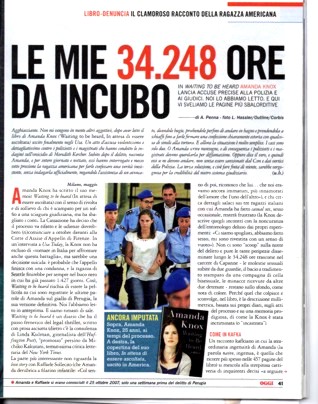
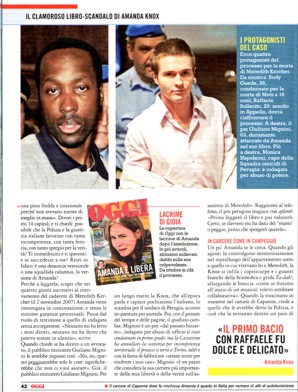
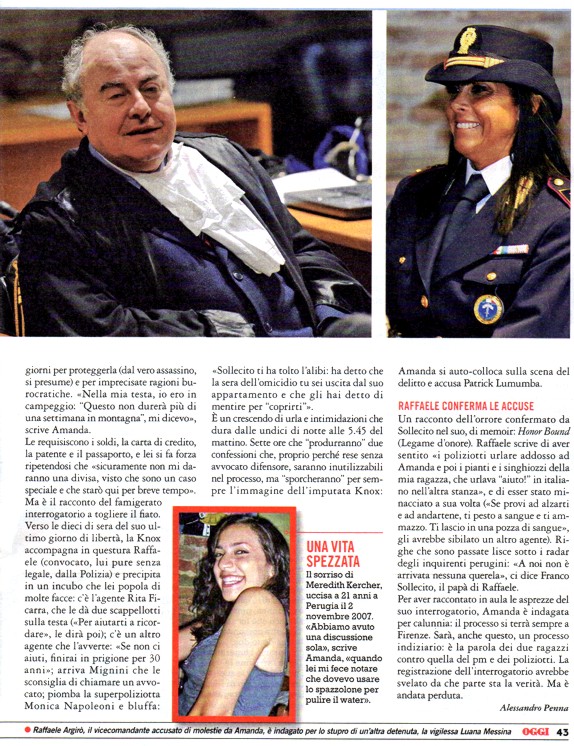
Saturday, May 04, 2013
Knox Book - What The Newly Published Writings Reveal To Professional Eyes (1)
Posted by SeekingUnderstanding

Amateurism run amoke is what the unprecedented and unwise Knox extravaganza is starting to look like.
Several TJMK posts below this one have already suggested that the book was rushed into print with very little fact-checking, with no restraint on damaging false accusations, and with no strategic legal considerations.
The same thing seems to have happened with the TV appearances.
Knox had a year and a quarter under wraps to prepare herself and yet her many exaggerated and over-emotional TV claims contradict many things SHE HERSELF has said previously.
She seems to have been rehearsed by handlers with little or no grasp of the extensive fact record.
And where has all this amateurism left her? Open to slow erosion of her credibility by an increasing number of commentators while considerably upping her peril in Italy.
Because many of her claims falsely accuse officers of the court, she could be further indicted for contempt of court, and she could see the five years which was lopped off her sentence by Judge Massei for “mitigating circumstances” reinstated.
Those of us with psychology credentials may not have all been expecting the same thing from Knox when she finally surfaced. But none of us expected to be confronted so forcefully with a classic case of a personality in turmoil.
My first impression after getting through to the end of the book was that it shows such serious disturbance psychologically, so much being revealed in her own words.
It wouldn’t be possible to classify AK as clinically insane, the niceties of this being so precise - but an abnormal mind is clearly illustrated. So clear that it is actually sad - that she has been allowed and encouraged to do this.
The ghost writing, or/and her own expression is also painful to read in terms of quality of writing. These are the main points that have emerged for me, from a psychological perspective, after reading:
AK’s grip on reality (even without drugs) is tragically lacking. It seems that she doesn’t know what a ‘fact’ is. Every fact and event is seen through a lens of her own feeling or emotion - logical connection being absent - together with how she believes it is best to make it appear.
‘Her “best truth” is this over and over again. She doesn’t even understand that this is considered by normal minds to be lying. She doesn’t seem to have a concept of lying.
- “their version of reality was taking over”... Does reality only come in versions?
- “something didn’t feel right. it seemed made up”. Does she not know?
AK continually refers to herself as “different”. She is, but not for the curious or trivial things she believes. She is also obsessively concerned to be seen and classified as a “good person”. This comes up over and over.
“I didnt want them to think I was a bad person”. Note, not: “I didn’t want to BE a bad person” but always “how will people think of me”. This is a continual theme. “I couldn’t believe anyone could think that of me”.
It does show a dissociative and non-integrated personality, with both deep roots and serious implications. There are also indications that she is unable to ‘read’ people’s faces /expressions with any accuracy. (Emotion recognition).
A more sinister and disturbing facet to her personality connected to the above, which comes through in every chapter, is the automatic disparagement of anyone who displeases her (which of course happens frequently - whenever, in fact, someone has a different version to ‘her best truth’).
Someone is then ‘useless’, ‘betraying me’, ‘stupid’, etc etc. These words are all said matter-of-factly…. as if they really are facts. Here are some more of these words, peppered within the text:
- ‘Repellant, self-serving’, ‘hostile’, ‘insincere’, ‘abandoned (me)’, ‘uninterested’, ‘aggressive’, ‘spiteful’, ‘curt’, ‘disdainful’
- ‘Old perv…lecherous’, ‘glared cruelly’, ‘idiotic’, ‘insidious’, ‘controlling’, ‘condescending’, ‘mean’, ‘hateful’, ‘ruthless’....
Note that it is not that AK finds these people to be these things, in her opinion- it is that they ARE these things.
The sub-text is: I am a good person, and they, having displeased or disagreed with me, are ‘bad’. Thus the mechanism for strong, unrestrained projection is at work.
Example: “The police couldn’t bear to admit they were wrong.” Could she, though?
Her projections are so blatant, that I quake for her lack of self-awareness. I used to read literature as a window into self-awareness, insight, philosophical depths, and questions of morality.
Sadly this book is about as far from offering these as one could go. A PR machine missile is not a ‘book’ in the sense I used to know.
AK reveals a very strong inner anger, the control of which is difficult, and which it would seem she is frightened of, and frightened of revealing.
She would also seem to be based in a passive aggressive stance, which gives rise to a side seen as nice and even gentle. These two sides seem badly split.
This would be in keeping with the Envy hypothesis (I refer to Melanie Klein’s ‘Envy and Gratitude’). There are a few definite examples of the consuming anger which Amanda herself describes graphically.
She continually justifies it, also. Sometimes, of course, anger may be justified (‘just anger’) but as described here it is nearer to a rage or a tantrum when things aren’t going according to how she wants them to.
This speaks of manipulation, which would be part of the same profile, and is essentially destructive and spoiling, as well as something that wells up with a will of its own.
She often exposes her state of mind in certain phrases, without realising the implications of what she is saying. This is why I think the whole thing is so sad, as she has been used (seemingly mainly for money) in this foolish venture.
For example: “In that instant I snapped.” when the detective said “you know who killed Meredith.” It wasn’t the pressure/abuse from the police that made her snap, it was being confronted with the truth.
NOT her ‘best truth,’ but one that was simply unbearable to hear. There are many other examples, littered throughout the book, of some of her inner chaos:
- “This is my own fault. I caused the confusion”
- “I wanted to disappear. I didn’t want to be me anymore”.
- “I didn’t know if I was allowed to keep my thoughts private…”
- “Like a roller coaster ride….can’t get off. This is all my own fault” .
- ” I was furious for putting myself in this situation”.
- Rafaelle - “He didn’t look at me. I wondered if he hated me”. (Why should he?)
- “We want justice. But against who? We all want to know, but we all don’t.”
There are many others. Amanda Knox said she loved Italy and I believe her. With adjustment she could have been a lot happier there than she perhaps ever was in Seattle. Now she is in the position of demonizing Italy and its good people there, and in the worst possible way.
Italy was in fact very kind to Amanda Knox, and her treatment there was on the right lines to give her hope of enduring stability. What a pity that dirty PR and legal tricks and money grubbing may have pushed that out of sight forever.
Wednesday, May 01, 2013
Although The YouTube Trailer Suggests Diane Sawyer Wimped Out And Turned All Mushy…
Posted by Peter Quennell

It could still be wrong. Trailers have been misleading before.
The interview is tonight at 10:00 on ABC. Our Main Posters Kermit and Media Watcher both have tips that could still win Diane Sawyer Pulitzer Prizes.
- Media Watcher: Diane Sawyer Interview With Amanda Knox: How To Push Back Against The False Claims And Emotion
- Kermit Powerpoint: Diane Sawyer’s Very Tough Interview With Amanda Knox: ABC Kindly Shares A Sneak Preview!
Here’s hoping. Even for Amanda Knox, our advice is usually the best. We’ll carry some sort of report on this tomorrow.
Monday, January 21, 2013
An Overview From Italy #2: Current Perceptions In Italy, Justice Perverters Fail, Mignini Vindicated
Posted by Machiavelli
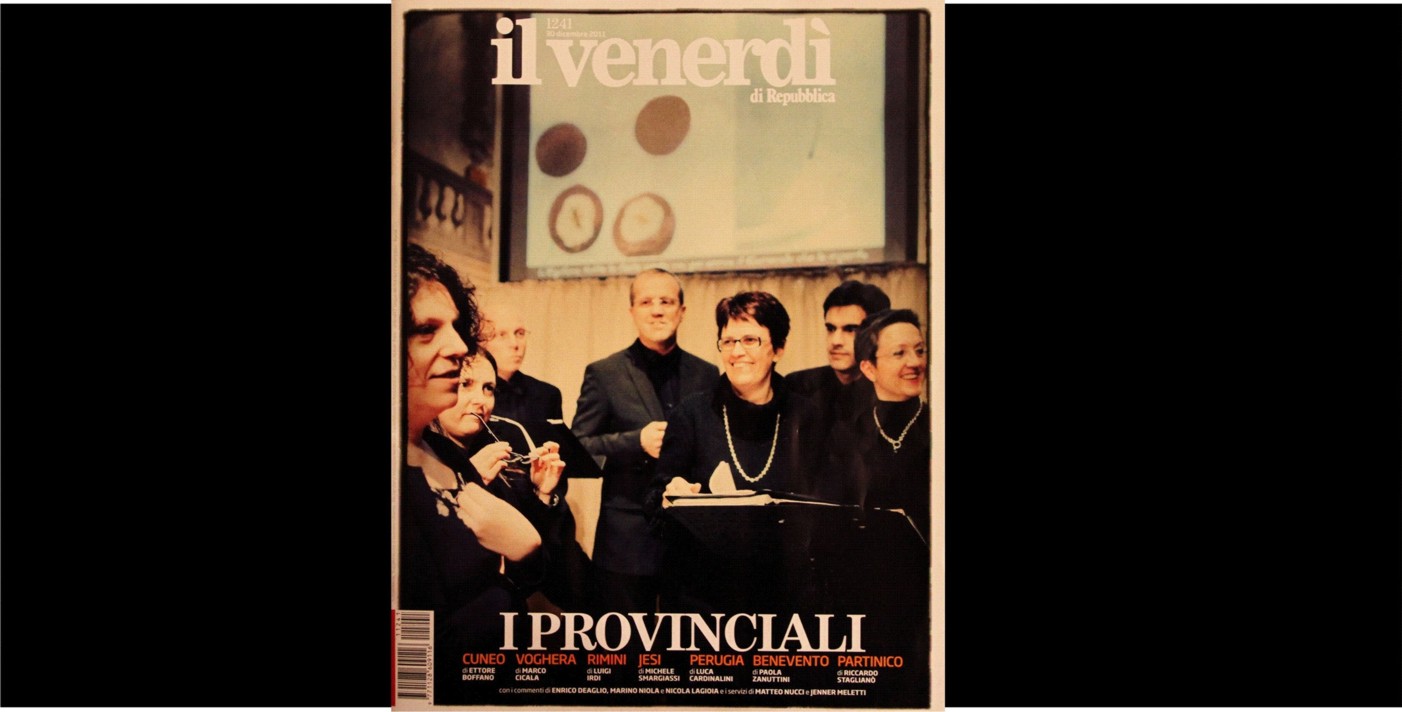
My previous report on the bad news remorselessly building here for the defense was on the Procura Generale appeal to the Supreme Court.
One year ago ““ between the end of December 2011 and beginning of January 2012 ““ there were only rare idle comments in the Italian press about the Meredith Kercher case, more or less sarcastically noting the “suspicious” circumstances of the Appeal trial. I recall how a mention of the topic was dropped into the last number of “ll Venerdì” of 2011.
“Il Venerdì di Repubblica” is the weekly magazine issued together with the newspaper “La Repubblica” (thus probably the most read magazine in Italy).
The cover theme of that week was provincialism ““ or better “the provincials” - the adjective used to assemble a sample of seven little cities (Cuneo, Voghera, Rimini, Jesi, Perugia, Benevento, Partinico), picked from different regions, and taken as examples on the theme, that is stories of “local colour”; what goes on in small “provincial places”. A few characters and stories are brought in to depict the local life of each place, and the voices of local authors adds something about the places.
The article about Perugia (at pages 62-68) was by Luca Cardinalini. In that number of Il Venerdì, having stories of “local colour” as weekly theme, there were shades of ironic tones for each city, often through the voice of local intellectuals. As Perugia is described, the Meredith trial is quickly recalled among its local stories; the reader can’t miss how this is viewed as in connection with another most remarkable feature of the city, that is Masonry.
According to Luca Cardinalini and Enrico Vaime, Masonry is called a “Specialty” of Perugia, like chocolate. Local author Enrico Vaime intends to convey the people’s perception about shady powers existing in the city, about a local environment saturated by plots and informal powers, as something behind recent strange judicial decisions such as the Hellmann verdict and the apparent dropping of the Narducci case. The widespread belief of Perugians that the Public Minister (prosecutor) is the righteous one shines through the words of Enrico Vaime.
Also notice how racism appears to be another key perception about the verdict. Quality media press in Italy has a typical style of understatement. This comment hints that it seems obvious that the Appeal was a racist verdict - and it was “expected” that they would find a way to blame the black one and the outcast.
Some of Perugian “provincialism” seems to include a very narrow localism of Perugian identity: a person from Orvieto is reported to be called “a foreigner” ; but this is because the cultural viewpoint is based on the assumption of a personal knowledge of all people. In among this, there is Vaime’s knowledge about how rooted Masonic tradition and power is in the city, in a scenario of “brotherhoods” and “tribes” (the article includes a photo of the most known “Masonic” monument in Perugia: the gryphon or griffen ““ the emblem of Perugia ““ grabbing a toppled Pope’s Tiara in a sign of rebellion).
The report by Vaime is objectively correct : the concentration of members of Masonic lodges in Perugia is the highest in the world, about 5 times the national average of Italy (which is anyway very high).
In Vaime’s wording decent people in Perugia are ‘Christians’ or ‘Communists’ ““ these are the names he uses to address the main categories he sees as “good” people, two transparent moral systems. He devolves skepticism toward the less transparent allegiances, the murky and informal connections to powers.
I believe these perceptions from one year ago, in this colorful article about Perugia, should be most interesting to the readers of this site.
The first part of the article on Perugia is not that interesting - it speaks mostly about a local character named Ivano Massetti, nicknamed “Savonarola of Umbrian football”, the director (“boss”) of a local TV network and leading showman of his own soccer talk show. I skipped this first part with depictions of local folks, and get to the point at p.66 where the Kercher case is first mentioned.
This is my translation of the article from this point:
[”¦](p.66 line 17):
As Enrico Vaime ““ a 100% Perugian, a writer, and among many other things fiercly provincial ““ already knows: “Only in Perugia do you hear people saying “actually Tizio [random guy] was not a native from Colombella, but from Piccione”, which is three times further”. And when his grandfathers (farther of his father) bearing the same name Enrico Vaime, moved his formal place of residence [to Perugia] from Spello, on the official documents they wrote “emigrated to Perugia and married to a foreigner from Orvieto”.
The roots are extremely deep. “Still today” Vaime says “when I say to my family “we go back home”, I mean here, in Perugia, where I have not owned a house for decades. And I still call the roads and shops with the names they had when I was a child, even if now the owners are foreigners, from Shangai or, as I say, from Terni”.
Vaime is cross with the bad reporters who described Perugia, in the Meredith murder case, as a capital of corruption and vice: “An invasion of charlatan journalists who, as they believed they were visiting a remote and lost province, they painted it as a sort of Chicago on the Trasimeno Lake”.
[The fact] that no Perugian was involved in that sad story, to them that was an irrelevant detail. And the trial ended just the way many Perugians expected: a black guy first wrongly put in jail, another black one convicted, the two white, good-looking, wealthy and well defended young people, free.
So it was that the Public Minister Giuliano Mignini became a target. He’s a Perugian whom the Perugians know as the dominus of the other judicial case ““ this also is, yes, entirely local ““ about which everybody talks and knows, but always in a low voice: the death of doctor Francesco Narducci, the one suspected of having ties to the crimes of the Monster of Florence. From the judicial point of view that was - by half ““ just another hole-in-the-water [a failure] for which some critics have hastily put the blame on some alleged lunacy of the public minister.
But”¦ however”¦ meanwhile, this [Naducci] corpse-swap was indeed found to have been for sure, a kind of unique case in the criminal history of the country. And, for what concerns the recent acquittals of those characters involved in this death, well, after almost a year and a half we are still waiting for the verdict motivations. All of the suspects were esteemed high-class professionals. That’s a perfect mix of strange deaths, sex, lead-astray investigations, and Masonry; this is in the city with the highest number of Masonic lodges in Italy.
Vaime sighs: “Masonry is something alien from me, but I have many friends who are in it. In Perugia it works as a compensation chamber for various powers, but also as an effort for the surge of the spirit to many decent people. Masters, masons and “33”, but all of them decent Perugians”. Masonry is considered a local specialty, just like the bruschetta or the Etruscan arch.
“One day you find out that that mediocre employee of your acquaintance, or the one who performed an incredible career in the public administration or in politics, is a “˜son of Horus’. Then you either laugh, or you slap yourself on the forehead just like saying to yourself “Wow! [how could I ] think about it!”. “That travet* [*a generic mediocre opportunist employee], too”
Vaime says “to me it is a strange Perugian, with little interest for the Egyptian god compared to his covet for entering inner circles of a certain world. Their internal motivation is “I want to see how the lords sit at the table”. But in there [Masonry], you see, there are also good Christians and good Communists; as has always happened in this province, which has the art of living together in its genes”.
[”¦. ]
This month ““ Jan 2013 ““ the Italian press returned to the topic of the case again in a few brief articles. This time it was because of Sollecito’s book.
After Maurizio Molinari’s report from New York on the book in September, and the busting by Bruno Vespa on Porta a Porta of Francesco Sollecito, who ended up openly contradicting his own son’s statements, another hint appeared in the local press about what is cooking up backstage.

This article in Perugia Today has a neutral take, but the same understatement and kind of vagueness as it anticipates that something very likely will happen.
What I find most delightful is the quotation marks in the title around the word “author” ““ journalist Nicola Bossi doesn’t believe for a moment that Sollecito actually wrote the book:
Meredith Case: “author” Sollecito at risk of criminal lawsuit
The recounts about an alleged negotiation in order to pin the main charges on Amanda Knox, and unproven violence by the Perugia Police are under target. Mignini is considering criminal lawsuit.
Written by Nicola Bossi ““ Jan 4. 2013
The Meredith case is not closed, and this despite books and movies almost tend to drop it after the acquittal in second instance of Amanda Knox and Raffaele Sollecito - who were convicted in first degree for the murder of the English girl that took place in Via della Pergola.
On upcoming March the 25th the Court of Cassation of Rome will have to decide on the request for a re-opening the trial, submitted by the Procura with the authorization of Public Minister Giuliano Mignini.
In the environment of the magistrates there is confidence about a [guilty] verdict that many ““ in Italy and in the USA - have heavily attempted to discredit. But from the same environments around them, they talk about a greatly serene Mignini making assessments about the next strategic moves, following the attacks directed against him ““ and against those in Law Enforcement who cooperated with him ““ contained in the book by Raffaele Sollecito.
An upcoming criminal defamation lawsuit is becoming more and more likely every day, especially about some particular paragraphs. The material published by Sollecito has already resulted in discussions and clamor above all about claimed negotiations [with the prosecution] aiming to shift the blame onto Amanda alone, to be rewarded with his immediate release.
But there are also accusations against the Police about violence during his interrogations. “If you dare get up and walk, I beat you up in a bloody pulp and I kill you. I leave you in a pool of blood”. This is what you read in the book “˜Honour Bound’ issued in the US, as what Sollecito attributes to the Perugian officers.
“They wanted me to lie so they could frame Amanda”: this is the premise of the claimed negotiations claimed to indirectly involve Mignini too, which he always denied. Allegedly this would have been enough to get [Sollecito] out from prison soon, leaving the American woman in trouble.
So, these are grave accusations which Mignini apparently does not intend to let go unpunished. The criminal lawsuit is likely to be filed earlier than the date of Cassazione [25 March].
Another small piece of news is this article below published in Leonardo and written by Valentina Cervelli:
It seems basically a “commented” version of the Perugia Today article. Cervelli adds a few polite lines on her own thoughts in this piece, published on the Bbooks page of Leonardo,it; this is my translation:
Is Raffaele Sollecito going be sued soon for “Honor Bound”?
By Valentina Cervelli - 6. Jan 2013
Are there troubles in sight for Raffaele Sollecito? His “Honour Bound” book is going well in the United States in terms of sales, but here in Italy it might be soon result for him in a lawsuit for defamation by the Law Enforcement forces and by the Public Minister Giuliano Mignini.
As we know already, in Honor Bound ““ My journey to hell with Amanda Knox and return Raffaele Sollecito has reconstructed the whole judiciary story from his point of view, telling in his autobiography what [he says] is his own truth.
On March 25 Cassation in Rome will decide on the [prosecution] request for the re-opening of the trial submitted by the Procura authorized by Giuliano Mignini, after the acquittal in the second instance of the two main accused, Sollecito and Amanda Knox.
The young woman has returned back to her country and we bet it’s going to be difficult, if not impossible, to get her back in our country even in case of retrial after Cassation and a possible conviction. But lets leave aside this possible dispute and lets focus on the book. In Raffaele’s book Mignini is iimplicated because he reportedly comes out discredited. In the material published by Sollecito in his book he even talks about alleged negotiations in order to blame Knox alone, obtaining in reward a quick release.
And what about the allegations of Police violence during interrogations? Of course we don’t get into the merits, but it seems obvious that parties that may be considered offended would tend to launch a counter-attack to defend their dignity and their work. At the moment no lawsuit has been submitted. But with much probability that will be done before the decision of Cassazione.
By now we can only wait for the publishing of the book in our country, in order to assess with our minds what Raffaele Sollcito has written and the “hot” material published in his made-in-the-US autobiography.
By the way; one thing Valentina Cervelli might get wrong is the purported good sales of Sollecito-Gumbel’s book.
The Amazon.com site is reliable as quick indicator of a product’s success; the price of a new copy of “Honor Bond” on Amazon.com is now $ 3.51 (last week it was 3.76; the cover price is $ 24). It suggests sales are not quite as expected. The drop speed is significant if you consider that the book has been out for only four months.

[Above: the Florence Palace of Justice]
While many honest magistrates seem to be working in Florence, there is still some strange behavior by one or two people in the Florence prosecution office.
Iin particular by the chief prosecutor there were some unexplainable decisions. As people reading this site know, Giuliano Mignini and Michele Giuttari were convicted (of some of the charges) in the first degree trial in Florence.
The motivations document was disconcerting because: besides the proof of their innocence on the main charge, what was described as the evidence on the remaining charge constituted extremely weak and vague arguments for what was claimed about Giuttari, while they were totally non-existent about Mignini.
In the second instance appeal as we know the court completely crushed the trial case.
The case against them collapsed not because of a technicality, as the FOAs falsely claimed. In the figment of their imagination the Knox supporters erroneously thought that the Florence court had an “option” to overturn the case, to find Mignini and Giuttari innocent, but that they instead decided to pass the judgment on to some other tribunal.
The pro-Knox believers are probably also ready to believe blindfolded that there was some kind of evidence against Mignini.
The Knox believers are wrong. What in fact happened in Florence is something almost unique in a judge’s career. The first remarkable event was the decision by the Florence court of nullifying the first degree verdict. They did not simply overturn the verdict (neither change, or “reform” it as we say) since an overturning would imply acceptance that a previous verdict actually existed and was legitimate.
The cancellation was in fact an in limine act about the validity , which does not require an assessment about it correctness. The court went way beyond. In fact they nullified the whole trial, not only the previous one in terms of judgment, but also the preliminary hearing, and the indictment; and even the request of indictment.
It is a legal outcome not comparable to a simple change or overturning because it is a ruling that the whole proceeding was illegitimate from the very roots. The investigation itself of Mignini and Giuttari was declared illegitimate.
If elements were found for the opening of an investigation, the prosecutor would be entitled to carry on their duties, though the investigators should be from another territory. This is important because the Florence court found evidence that people from the same office were involved in cases against Giuttari and Mignini, both as offended parties and as prosecutors.
Because of a basic conflict of interest, the local prosecutors were incompatible and the Procura of Florence had no jurisdiction. Not even Genoa would be compatible.
Florentine prosecutors therefore had no right to bring cases against Mignini and Giuttari. The investigation files now must now be sent to the competent jurisdiction ““ where they should have been sent from the beginning ““ which is Turin; there other legitimate prosecutors will decide if and how there is anything to investigate about, and if there are any charges to bring against anyone. The Florentine trials should have never taken place. The court ordered that the legitimate investigators are the Procura of Turin.
In addition, they also ruled that the court of Florence would be an incompetent jurisdiction in any further possible case that stems from that investigation: since the competent prosecution is Turin, in case elements for the indictment of anyone for any charge are found, in the future, everything should go to a court in Turin ““ this, only if there will be any charge to bring to court .
This decision in Florence was a total debacle for the Florence prosecutors. It is in fact “politically” much worse than an overturning of a verdict. It is not just a like a different conclusion on the merit, it is the decision to take away even the investigation from them, a kind of implicit censure of their work as highly illegitimate.
But at this point in the procedings, something even worse and even more strange happened. The Procura of Florence did something even more unusual, in fact unprecedented as far as I know.
Apparently the Florence prosecutors are not happy at all to pass the investigation file on to Turin. For some reason they seem instead to want to do unnecessary and irrelevant hard work instead. The Florentine prosecutors impugned the decision and revisited this at the Supreme Court against the Florentine judges.
This step is almost unheard of because the decision of the Florence appeal court is of a type that manifestly cannot be impugned at the Supreme Court. The recourse is obviously going to be declared inadmissible. If that submission was done by a private citizen, they would get a heavy fine for that.
Here it is a power in the Florence judiciary branch making this inadmissible move; for unknown reasons.
I’d like to know the real motive behind the latest Florence move, the only effect of which can be a waste of time (and money), a delay, of at least one or maybe two more years, which only makes the failure of the whole proceeding against Mignini and Giuttari more likely due to lapse on an expiration terms.
I say “I’d like to know” but in fact one motivation stands out as obvious: the whole proceeding against Giuttari and Mignini, from the first bringing of the charges at the lower courts, appeared as having a wasting of time among its purposes.
One practical effect - maybe a practical purpose - of pushing the charges against Mignini, was taking the file about the Monster of Florence case links with the Narducci case away from Perugia. By this move, the Florentine prosecutors managed to factually put their hands on the Narducci-MoF file and remove it from the investigating powers in Perugia.
Another effect of this was delay. Now this latest move looks as if its purpose were to delay, as much as possible, the transfer of the legal documents to Turin.
What is the ultimate event that, by all this, they seem to be seeking to delay? I can’t know for sure, I can only guess; in fact, I have only one answer, which also stands out as something obvious for those who know a bit of the backstage:
Giuliano Mignini is not an ordinary magistrate, he belongs to the Anti-Mafia Territorial Division of Umbria, and recently was selected for a further promotion by the Supreme Council of Magistrates.
In fact what is delayed is the advancing of Mignini’s career: in fact he has been already promoted to a directive function; but, by the rules, his taking the post was frozen while awaiting the outcome and conclusion of the Florentine prosecution.
Prosecutor Mignini is de facto already functioning as a prominent Magistrate in Perugia and considered as such; but formally he has not been given the directive power. Several people ““ among them Spezi and a number of his journalist friends, but possibly also other much more important people too ““ are likely not at all eager to see Mignini awarded further power.
About the latest endeavor by Raffaele Sollecito, who became liable for criminal defamation by writing false allegations about Mignini and others in his book, I expect - as logically unavoidable ““ that several powers and subjects will basically have no option but taking legal against him.
There will be a strategic necessity to doing this in order to prevent extradition issues in the future, but also, above all, on principle, because Sollecito made false claims about public institutions that needt to have their names cleared. Considering the kind of allegations against the judiciary as an institution, and considering that Mignini is a judge of the Anti-Mafia Division, this is the kind of lawsuit that I see as likely to be submitted on a national level, in Rome.
If that is the case, it would not be the only strange thing that the courts of Rome will deal with.
It seems like there is a kind of “curse” on proceedings related to the Narducci case. All sections of the Supreme Court which have been asked seem to have attempted to declare themselves “˜incompetent’ about re-opening the cases related to the Perugian doctor. The Cassazione is a huge office with a hundred judges working there, but maybe not so many of them are eager to deal with this case.
This could be only a coincidence. It only brings up to my mind, through a free association of thoughts, a more generic question ““ a personal question of mine ““ that is whether the words “Masonry” and “Politics” have an echo in Roman corridors too.
*****
Finally I want to add another significant piece of Italian news.
The news a week ago was that the Procura of Florence is investigating a possible corruption/mafia plot involving construction enterprises and politicians that revolves around the building of a new high speed railway in Florence.
Some 31 people are being investigated and among them is the former governor of Umbria. A huge drilling machine ““ nicknamed the “Mona Lisa” ““ used to dig subway tunnels in Florence was sequestrated by the Procura.
In the last couple of years Perugia’s prosecution office had a main role in fighting political corruption, but it seems that the Florence Anti-Mafia division is also active, just as it was in the times when the prosecutor Vigna worked with them.
Vigna was the one who first evolved the “secret sect” scenario in the Monster of Florence case, raising unexpected problems among the Procura staff.
Saturday, January 12, 2013
How Much To Place Blame On Guede? IMMENSE Headache For RS & AK Teams
Posted by Cardiol MD
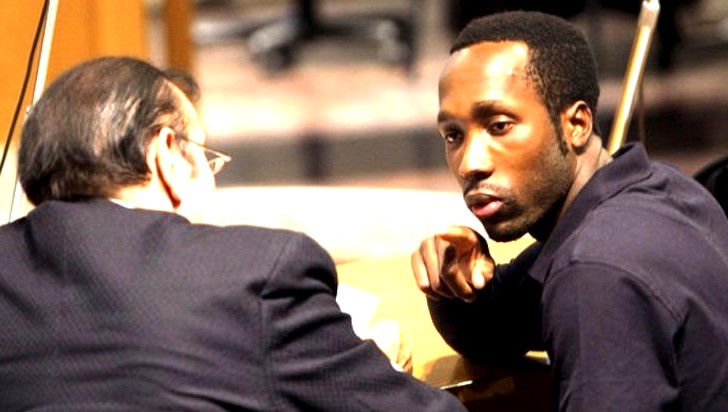
[Photo by Andrea Vogt as in December 2010 Supreme Court decides that Rudy Guede didnt act alone]
Zero To 100% Guede Was Claimed Sole Attacker
On a scale of 0% to 100% how much of the blame for the crime against Meredith has been heaped on Rudy Guede?
Well, it certainly varies. In trial court and first-appeal court it was never ever 100%.
Seemingly very scared of the harm Guede could do to their clients, if they provoked him into telling all, defense lawyers have acted consistently since 2008 and more-so since December 2010 as if they walk on eggshells around him.
In fact among the defendants and their teams only ONCE was Guede ever blamed 100%.
Sollecito’s bizarrely-titled Honor Bound 2012 book, the factually unchecked one, which now is causing him and his defense team so much trouble, was the first instance ever among those accused to try to blame Guede for the crime 100%.
Our next post will look at the categoric claims against Guede by whoever wrote that book. Meanwhile, here and now, let’s start at the beginning.
Commencing from when they were arrested, Amanda Knox pointed decisively at a black man, but of course she pointed at the wrong one: Patrick Lumumba. Make that 0% . Not long after they were arrested, Knox and Sollecito were strongly questioning the role of one another. So 100% against each other, but still a zero against Mr Guede.
In his messages from Germany Guede blamed two hasty intruders though he had no choice but to say he was there. Perhaps 33% at this point. After Guede was captured, Sollecito implied that they were at the crime scene together because he was worried that Guede would implicate him. Make that 50%.
At Guede’s short-form trial In October 2008, Judge Micheli blamed Guede 33% too. In sending Knox and Sollecito to full trial he dismissed the lone wolf theory (never really to be revived in court again) and he tentatively believed the evidence pointed to their being equally guilty.
In fact Judge Micheli tentatively blamed Knox for instigating both the attack on Meredith and the rearrangement of the crime scene. In effect he allocated 50% of the blame to Amanda Knox and 25% each to Guede and Sollecito.
Throughout trial in 2009 the Knox and Sollecito defense teams seemed to take great care not ever to blame Guede 100%, perhaps because (for murky reasons not made public) Rudy Guede had refused to testify against their clients.
Judge Massei assigned Guede 33% of the blame as he concluded that Guede had initiated the attack but that Knox and Sollecito had wielded the knives and that one of them had struck the final blow.
During trial and thereafter, the defense lawyers for the three were often on Italian TV and as our main poster the Italian lawyer Cesare Beccaria exhaustively charted in a four-part series, each “gently” blamed the other two.
We can assume that is either 33% or 50% but never more than that.
On February 24. 2011, in the Supreme Court report, on its rejection of Guede’s final appeal of his sentence for involvement in killing Meredith, blamed Rudy Guede and two others equally. Some 33% of the blame each.
The Supreme Court relied upon three facts: the physical evidence of Guede’s presence at the flat, Guede’s actual admission of his presence, and Guede’s implicit admission of shared-guilt in his documented Skype InstaMessage to Giacomo Benedetti on Nov. 19, 2007 (“I was scared that they would say I was the only guilty person”).
In a nutshell, the situation at the start of the Sollecito and Knox appeal before Judges Hellmann and Zanetti in 2011 was this:
- The Supreme Court had decided that Rudy Guede acting ALONE could not have attacked Meredith with several knives over an estimated 15 minutes, left so little physical evidence upon her, staged the break-in via the absurd route of Filomena’s window while leaving zero DNA in her room, placed Sollecito’s DNA on Meredith’s bra clasp, engineered several traces of Knox’s and Sollecito’s footprints outside the room, and placed the mixed DNA of Meredith and Knox in several different locations outside Meredith’s locked door.
- But there remains zero evidence that perps two and three which the physical evidence strongly pointed to were anyone other than Knox and Sollecito. There’s really not one speck of hard evidence to the contrary. Defenses somewhat desperately tried to engineer some at first appeal from the seemingly perjured testimony of jailbirds Alessi and Aviello and some smoke-blowing over the DNA testing, but in terms of HARD evidence came up empty-handed. Alessi did a meltdown on the stand, while Aviello turned completely cuckoo, and Judges Hellmann and Zanetti had to invent arguments frantically to dig Knox and Sollecito out of that hole.
I have done a series of posts (to be read from the bottom upward) on the Hellmann-Zanetti outcome covering many other aspects of their strange arguments.
Back in late 2010 some of us at TJMK were impressed at the alacrity with which Judge Hellman selected Conti and Vecchiotti.
We were thinking that “he had already thought it all out” [we seem to have got that-much right], and that he was “being prudently responsive to the legal and political pressures bearing down on him, and knows the ruling also calls the defendants’ bluff.”
I had posted that the defenses of Knox and Sollecito seemed to be trying to exclude evidence that they themselves tried to destroy, essentially on the grounds that their destructive attempts failed to destroy all of it, and left behind only some of it. Their argument had boiled down to whether the disputed DNA evidence is more unfairly prejudicial than probative.
It was my opinion that because it was the defendants’ deliberate conduct that nearly succeeded in extinguishing all their DNA, any US and UK courts would admit this highly relevant evidence, and let the participants duke out its fairness, in open court, in front of a jury.
I had thought that was what the Massei Court had already done, and was what the Hellmann/Zanetti court was then doing. The Hellmann/Zanetti court was doing that - but that was not all it was doing, as we now know and regret.
I had believed that the defendants would bitterly regret their petition for such DNA Expert-Opinion Review. We should know in March 2013 if they regret it at all, let alone “˜bitterly’. So far they may not, but Sollecito’s current venture into special-pleading journalism in his book seems likely to accelerate their journey to a bitter and regretted destiny.
We were less impressed with how Judge Zanetti started the appeal hearings.
To his eternal discredit Judge Zenetti uttered words to the effect that “the only thing that is “˜certain’ in Meredith’s case is that Meredith is dead.” Nothing else. In effect, illegally promising a whole new trial at appeal level - very much frowned on by the Supreme Court.
Unless the word “˜thing’ is a mistranslation, that is not the only thing that was already certain in Meredith’s Case; Many Things were then certain in her case.
For example, it is certain that the first-ever documented references to Meredith’s scream just before she was killed had already come both from the mouth of Amanda Knox herself, and from the hand of Amanda Knox, in the case of her contemporaneous personal hand-written notes.
Guede, himself, had certainly already made a documented reference to Meredith’s scream.
It was also certain that Guede had made documented references to his actual presence when Meredith screamed.
Some of these already-certain facts inconveniently undermined Hellmann’s and Zanetti’s already-assumed conclusions, so they then proceeded in-turn to undermine the “˜reliability’ of those facts, e.g. “˜it is not certain that the scream was Meredith’s scream; it could have been someone-else’s scream’; or even Amanda’s scream?
The Massei court had exhaustively presented the evidence from all sources in their conclusion that Knox and Sollecito were the ones who shared Guede’s guilt. But Hellmann/Zanetti then contradicted ALL the previous finders-of-fact with regard to Guede, essentially using five ploys in arguing:
- That Guede was Unreliable: “for example, in the questioning before the Prosecutor, he denies being known by the nickname of Baron, “¦.so as to result in a version completely incompatible with the reality of the facts as perceived and heard…” [Is that ever giving birth to a mouse?], and
- That the Supreme Court had “held Rudy Guede to be an Unreliable person”, and
- That “therefore, among the evidence against the two accused, the testimony given at the hearing of June 27, 2011 by Rudy Guede cannot be included because it is Unreliable, nor can the contents of the letter written by him and sent to his lawyers”, and
- That concerning Guede’s documented Skype InstaMessage to Giacomo Benedetti on Nov. 19, 2007 “”¦ the contents of the chat between Rudy Guede and his friend Giacomo Benedetti on the day of November 19, 2007, also listened to by the Police, can be considered in favour of the two accused”, because “he would not have had any reason to keep quiet about such a circumstance,”
- And that “So, in the course of that chat with his friend….. Rudy Guede does not indicate in any way Amanda Knox and Raffaele Sollecito as the perpetrators…..” and “.....he would not have had any reason to keep quiet about such a circumstance….. he being…. certainly the perpetrator….. of the crimes carried out in via della Pergola, that if Amanda Knox and Raffaele Sollecito had also participated, that he would at that moment have revealed this to his friend.”
So, summarising Hellmann and Zanetti, they have absurdly argued a contradiction:
- Because of Guedes notoriously unreliability, the public evidence in which he did accuse Knox and Sollecito cannot be considered as evidence of their guilt, but
- In spite of Guede’s notorious unreliability, because Guede did not accuse Knox and Sollecito in a private conversation this must be considered as conclusive evidence of their innocence.
We are not the audience to which Dr Galati’s appeal against Hellmann and Zanetti to the Supreme Court is directed. Most of us probably have some difficulty with its legalese, translated into English, so bear with it.
Dr Galati’s appeal against Hellmann and Zanetti refers to Guede’s documented Skype InstaMessage to Giacomo Benedetti on Nov. 19, 2007 as follows:
The Hellmann/Zanetti court, “has”¦ made “¦. completely anomalous use of the Skype call, accepting it for the time of Kercher’s death, but not for other circumstances which are also extremely relevant for judgment purposes, but which have been totally ignored.
In fact, in the call, Guede recounts having heard Meredith complaining about her missing money and of her intention of asking Ms Knox, with whom she had quarrelled, for an explanation (p. 10 of the call [transcript]), of having seen Meredith look in vain for the missing money in her drawer (p. 18), then of having seen Meredith look, still in vain, for her missing money in Amanda’s room (pp. 18-19 of the call [transcript]), and of having heard a girl enter the house, who could have been one of the roommates, thus Amanda (p. 11 of the call [transcript]), while the Ivorian found himself in the bathroom, just before hearing Meredith’s terrible scream which would have caused him [59] to exit the bathroom, about five minutes after the girl’s ingress (p 12 of the call [transcript])”... .
The Court has, in practice, without reason thrown the responsibility onto Guede for throwing the rock and clambering in (see pp 121-122 of the appealed judgment): in the same Skype call, Guede, however, repeatedly denies having seen the broken window in Romanelli’s room during the whole time in which he was in the house at Via della Pergola on that evening (pp 8, 20, 34 of the call [transcript]). Not only that: Rudy Guede also said that he was at Knox’s many times”› (pp 88 of the call [transcript]).
If the Court held the Ivorian citizen to be sincere in the tele-conversation with his friend Benedetti, then why not also believe him when he denies having broken in, or when he recounts Meredith having it out with Amanda, or when he says that he had been at the latter’s place many times”›?
Dr Galati’s appeal to the Supreme Court argues that the Hellmann/Zanetti appeal judgment, apart from being manifestly illogical, is manifestly contradictory with respect to the contents of the case file referred to (Article 606(e) Criminal Procedure Code). Here is what it says about their tortured interpretations of Rudy Guede.
And in the Skype call with Benedetti, intercepted unbeknownst to him, there emerge circumstances that confirm Guede’s court declarations. The Court takes the Skype call with his friend Benedetti into examination, valuing it “šin favour of the two accused”› both for what it does not say and also for what it does say, and this it does building from one, not only unexplained, datum but which would have taken little to deny: since Rudy was outside of Italy, he was in some sense safe”› and thus could well have been able to tell the whole truth (p 40 of the judgment).
Not in the least does the Court depart from the presupposition that in this call Rudy would have been telling the truth and, because in this call he would not have named the current defendants, these have got nothing to do with the homicide. The Court does not explain, though, that even in this call Rudy was tending to downplay his responsibility and, if he had named his co-participants, that would have easily allowed, by means of investigations and subsequent interviews, the bringing out of his causal contribution and of his responsibility.
[91] Of the things said in this Skype call, the Court seems at one moment to want to value the chronological datum from 9:00 PM to 9:30 PM to affirm that this would therefore have been the time of death of Meredith; successively, though the appeal judges, following the principle of plausible hypothesis, in relation to the outgoing calls on the victim’s English handset, have moved it to 10:15 PM, but they have not altered the reliability of the time indicated by Guede.
In truth, during the course of the conversation, Rudy recounts having heard Meredith complain about the missing money and of her intention to ask Knox, with whom she had argued, for an explanation (p 10 of the call); of having seen Meredith look in vain for the missing money in her drawer (see p 18); of having seen her search, again in vain, for the missing money in Amanda’s room (pp 18 and 19 of the call) and of having heard a girl enter the house ““ who must have been one of the flatmates, thus Amanda (p 11 of the call), ““ while he was in the bathroom, a little before hearing Meredith’s terrible scream which would have induced him to exit the bathroom, about five minutes after the ingress of the girl (p 12 of the call).
And also, on the subject of the break-in in Romanelli’s room ““ thrown without explanation onto Guede’s back (see the judgment being appealed from, at pp 121 and 122) ““ can remarks by the Ivorian citizen be found in the transcription of the intercept. Guede repeatedly denies having seen the broken window in Romanelli’s room for the whole time in which he was in the house at Via della Pergola that evening (pp 8, 20, 34 of the call).
If the [Appeal Court] had held as reliable what Rudy narrated in the Skype call relating to the time in which Meredith was killed, it supplies no reason at all, on the other hand, for why it does not believe him as well when he denies [92] having committed the break-in or when he recounts the quarrel of Meredith with Amanda.”
None of this changes my own beliefs that there are even many more things in evidence that are “˜beyond any reasonable doubt’. For example:
- It is beyond any reasonable doubt that Meredith was restrained by hands other than the knife-wielding hand(s); and that Meredith was restrained by the hands of two, or three persons as she was killed.
- It is beyond any reasonable doubt that steps were taken to clean away smears made by Meredith’s blood in the place where she was killed, and tracks of Meredith’s blood transferred by her killers to other places.
- It is beyond any reasonable doubt that steps were also taken to simulate a break-in that never-was.
In the next post, we examine Dr Galati’s appeal further and the strident claims against Guede made in Sollecito’s own book which contradict some of the positions of HIS OWN LAWYERS. Note that Dr Galati has argued in the appeal that it was ILLEGAL for Hellmann and Zanetti not to have taken the Supreme Court’s ruling on three perps fully into account and having innored it or brushed past it.
Verrrry tough situation for defense counsel to be in.
Sunday, September 30, 2012
Correcting Sollecito: A Task In Which We’d Like To Invite Everybody Here To Help DRAFT
Posted by Our Main Posters

[Image above: Francesco Sollecito, left, trying to defend his loose-canon son on Italian national TV]
What was Sollecito thinking? If he was indeed thinking?
To our Italian lawyers his highly aggressive and inaccurate book seems a really misconceived attempt at an extra-legal end-run, by someone with low credibility and an over-sized ego who still stands accused of murdering Meredith.
Especially in face of an increasingly widespread grasp beyond Italy of the real facts - and of a remarkable Italian Supreme Court appeal by the prosecution which looks to be almost impossible to beat.
Main sources for the “research” by the shadow writer Andrew Gumbel seem to be Nina Burleigh and Candace Dempsey, two PR shills for the Knox family with notorious chips on their shoulders toward Italy. Andrew Gumbel seems to have anti-Italy and competency issues of his own.
None of the three are lawyers. In fact no good lawyers are publicly standing up for the two accused and repeating any of the junk law or false facts or defamatory claims in the book.
Simon & Schuster don’t seem to have insisted on any fact-checking or checking against Italian law. New charges against Sollecito have already been threatened in Italy based on the couple of pages made famous by the Porta a Porta TV program, during which Sollecito’s own father had to distance himself sharply from his son’s claims.
Italian authorities and media read here. We’d like to help them further by identifying just which “facts” are wrong in the book (in places Sollecito even contradicts his own past words) and who is unfairly depicted, which seems to be just about everybody.
Our new book corrections page is here. It can also be reached via the new link in the left column. All help is most welcome.
Wednesday, September 19, 2012
The Rather Strained Couric-Sollecito Interview: Reading Between The Lines (1)
Posted by Hopeful

Raffaele’s physical appearance was okay. He was groomed and dressed well. I alternately felt sorry for him and grossed out by him when I sensed he was lying from a cunning script.
He has taken a page out of Amanda’s playbook by using English instead of his native Italian with a translator, so the audience will identify with him and so he can buy time to formulate safe answers. He wants to show off to Amanda that he is as quick to master language as she is.
Katie Couric definitely put him on the defensive. Her maturity and restraint honed over years of interviews gave her the advantage. It must be so hard to smile and remain polite when you harbor suspicions you’re talking to a liar and stonecold killer. Her civility and training stood her in good stead.
She didn’t reveal too much disgust, but some slipped out. She did poke and prod for hard truth as much as possible within the limited format.
I think the biggest clue to Raffaele’s dishonesty was his refusal to denounce Meredith’s “real” killer, Rudy Guede. Had he not been part of the violence or obstruction of justice against Meredith, he would have the moral high ground to express natural horror rage and resentment against this “real” killer, a killer whose act has also destroyed Sollecito’s life.
If he were totally innocent, Raffaele would want only to name and shame Guede and howl for the harshest punishment. If Guede had gotten me involved in such a nightmare I would blame him without regret and with no game-playing or fear of his lies. The fact that Raf does not dare to anger Guede and refuses to judge the known killer who has dropped Raf into a living hell is a sign of some perverse obligation to Guede, fear of Guede, or guilty knowledge or some unnatural response.
He refuses to denounce Guede, while he revels in his coverup for Amanda. This suggests he is part of the crime. He denounces prison loudly enough! He seemed to want to say that prison serves absolutely no purpose at all, incarceration accomplishes nothing. This is simply a reflection of how much he hated prison, not how little he deserved it.
His big glory seems to be bucking his family, and rejecting their good advice, while professing to understand they are blinded by love and concern for him.
His tone is condescending. No, he will spare his family nothing. He prefers to turn his back on their best interests (which would be to have a son who could earn a solid living and eventually help his father in old age or sister, has Raf ever thought of success as a gift he can give them? No, it seems he wants drama and destruction and waste).
While his book claims Dr. and Sister Sollecito were begging him to reveal the truth regardless of whether it hurt Amanda or not, he turns his back on them and on truth completely. His desire is to honor a wildcat female who used him and cost his father and sister everything.
What a mockery of real honor. He’s ready to save Amanda a prison sentence no matter how big a liar he must become or how much terror he brings to his family or expense and stress on them. His childish and mistaken attitude was that Amanda loves him, Amanda is all that matters.
Thus he becomes a foolish and destructive ennabler, saving Amanda from the natural results of her own bad acts that would finally teach her something real. He wants to rescue her and his vanity since she reflects his romantic choice and he doesn’t want that criticized.
He will rescue her at cost of destroying the family who has truly loved him and stood by him, even though he has so many unresolved issues with them. I think this is because he has not felt strong enough to stand up to his family in the normal teenage years of establishing boundaries, usually through mild rebellion.
His fear of losing his father since he was motherless, or their overbearing powerful personalities (doctor and policeman) left his growth undone at the normal time. He is still a child. But his role in this crime has become a way out for him.
Raf is in hog heaven. He can emigrate from Italy to the U.S. for survival reasons that his folks must understand, since they assure him they don’t want him in prison. This is his way to get others to boot him to where he wanted to go all along. (Munich wasn’t far enough, and he was soon back home dejected.)
His biggest joy seems to be deceiving the police. His sister’s biggest mistake was doing shady stuff to help this ingrate brother, and his father will learn the same lesson.
It’s really sad because Dr. Francesco Sollecito Senior deserves better than this from his only son. Raf wants to lower the bar on their expectations of him. In that he has succeeded. His main goal is to disappoint his father and compromise his sister since he cannot compete with their workplace achievements and no longer has a mother to protect.
Raffaele took another page from Amanda by giving a lengthy and ambiguous answer to the question, “What would you say to people who still think you are guilty?” He never gets around to categorically denying he killed Meredith! Instead he harps on the media having deceived the public.
Of course the fog of nonsense is his own and Amanda’s.
Tuesday, September 18, 2012
Questions For Sollecito: Katie Couric, Push Back Against Sollecito’s Bluster And False Facts #2
Posted by Our Main Posters

[The vastly more talented person, Meredith, who the smug and odious Sollecito still stands accused of killing]
Kermit has suggested some very tough questions in the Powerpoints post directly below.
Here are ten more of the possible dozens of unanswered questions that Katie Couric and other media interviewers of Sollecito should ask him, and we invite readers to suggest more questions in Comments below.
II should be recalled that all three suspects were brought to trial on the same body of evidence. Judges at Guede’s trial court, his first appeal court, and the Supreme Court of Cassation have all ruled that the evidence showed that it was impossible for him to have attacked Meredith alone.
Despite contradictory efforts by the defenses in the Sollecito and Knox appeal to make credible two possible sets of alternative killers, both attempts descended into courtroom farce. Right now, all of the considerable body of evidence still points ONLY at the three originally charged.
Several context points from the previous post below with this same title should be reiterated here.
1) Sollecito was NOT finally acquitted at the end of 2011; as all the media have been wrongly parroting. He still stands accused until the appeal process fully plays out - and in some similar cases, that has taken years. As he is still accused of a murder and other felonies he might be in the United States illegally.
2) The investigation and crime-scene analysis resulted in a very powerful case at trial, the trial judges’ reasoning was brilliant and precise, and they showed NO media influence, NO satanic theory, NO desperate prosecutor, NO rush to judgment, and NO hint that it had all been inspired by Knox’s and Sollecito’s quirky behavior, or by a misinterpretation of the effect of drugs.
3) Knox and Sollecito were convicted at trial based on clashing alibis, autopsy evidence, blood evidence, footprint evidence, cellphone evidence, computer-use evidence, eye-witness evidence, and so on and on. In the UK and US any ONE item might have been enough. They both refused to be fully cross examined at trial. Knox was only partly examined, about her false charge of murder against Patrick Lumumba, but even so she did herself harm.
4) A bizarre and suspect last-minute change of appeal judges resulted in a bizarre and suspect court management, a bizarre and suspect DNA consultancy, a bizarre and suspect appeal verdict, and a bizarre and suspect appeal sentencing report - which in enormous detail has been dissected by the Chief Prosecutor of Umbria, Dr Galati, in an appeal to the Supreme Court and shown to have broken Italian law in a large number of respects.
5) The entire officialdom of Perugia holds a pro-guilt view. Dr Galati holds this view. Relevant officials in Rome all hold this view. Probably 95 percent of the interested Italian population hold this view. The vast majority of Italian journalists hold this view. The Rome-based foreign reporters all hold this view. A large if unknown fraction in the UK and US populations hold this view. Behind the scenes in the NYC media, a majority seem to hold this view. Hillary Clinton and the ambassador in Rome hold this view. Knox’s and Sollecito’s lawyers at trial in 2009 seemed less than firm believers in their innocence. Both families have acted as if they KNEW there was guilty involvement all along.
While Sollecito did not take the stand during the trial or the appeal, he did make a number of voluntary written statements entitled “Notes on a Prison Journey” which were edited and given to the media by his lawyers. These notes have been meticulously translated into English by the PMF translators and are available here. They don’t show him in an innocent light.
With so many questions unanswered, it would be unconscionable for any good reporter or network to allow Sollecito to promote his book and case one-sidedly on their nationally-syndicated talk shows without answering some tough questions. Keeping in mind that a talk show is not the best place to debate forensic evidence and other intricacies of the case, we offer these ten example questions in other areas, which with Kermits questions below should start to get to the core of what Sollecito did and didn’t do on the night.
1. The Kercher family has asked that people involved in the case keep a low profile out of respect for their daughter Meredith. What effect do you think your loud promotion of this tendentious book deal will have on the Kerchers?
2. Did your publisher, Simon & Schuster, express any concern that you might yet be convicted of this murder, if the Supreme Court rules in March that you were improperly acquitted? And that if Italian officialdom is smeared, they may risk charges of calunnia?
3. You were the person closest to Amanda Knox in the days before the murder. Why did you write that Amanda was “detached from reality?” What in your view is her psychology? Is she loyal to you? And do you always see eye to eye?
4. You and Amanda were among the last people to see Meredith alive. Did you hear Meredith’s conversation with Amanda, if any, before she left to have dinner with friends? If so, what was said, and in what tone?
5. That afternoon you claim the two of you merely smoked a little marijuana but both suffered mental black-outs. Amazing. Medically very unusual. At what time precisely did you both stop remembering, and at what time did you both start remembering again?
6. If neither of you can remember what happened that night, how can you be so sure you and Amanda had nothing to do with the murder? How in that light do you account for highly incriminating forensic and computer and cellphone and eyewitness evidence?
7. Inconsistencies between Amanda’s account of what she found at her cottage the next morning, and what you said you saw when you got there, make the story seem made up. For example, you wrote that the first thing you noticed - you said that you remembered this particularly well - was one of the bedroom doors was wide open, the window was broken and the room was a mess. But Amanda wrote that the door was closed and the break-in wasn’t discovered until you conducted a search of the house. Why don’t your stories match?
8. Both of you have described how, after Meredith didn’t answer, you tried to kick down her bedroom door. It was easily pushed in later. Were you surprised that you were unable to break it down, despite having taken eight years of kickboxing lessons?
9. Were the police wrong to arrest you after you specifically and quite readily told them that Amanda had persuaded you to lie to them, and to say that she’d been home with you all night when you had consistently maintained that she wasn’t?
10. Rudy Guede, the man confirmed convicted by the Supreme Court of Cassation of murder and a sex crime, in complicity (“in concorso”) with two other people, says that you were the other two people there. Guede is eligible for parole later this decade. Do you think that his parole should be denied? Did the Supreme Court get it wrong? Is Guede the sole killer, and if so how?

